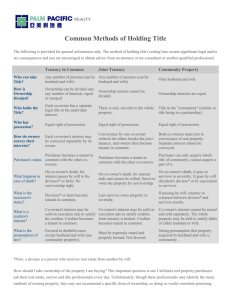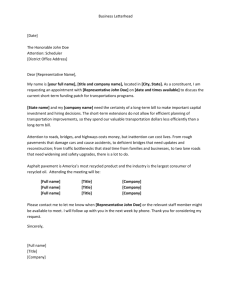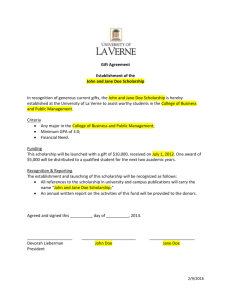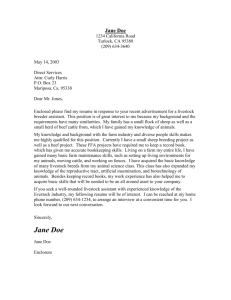TITLE VESTING SCHEDULE
advertisement
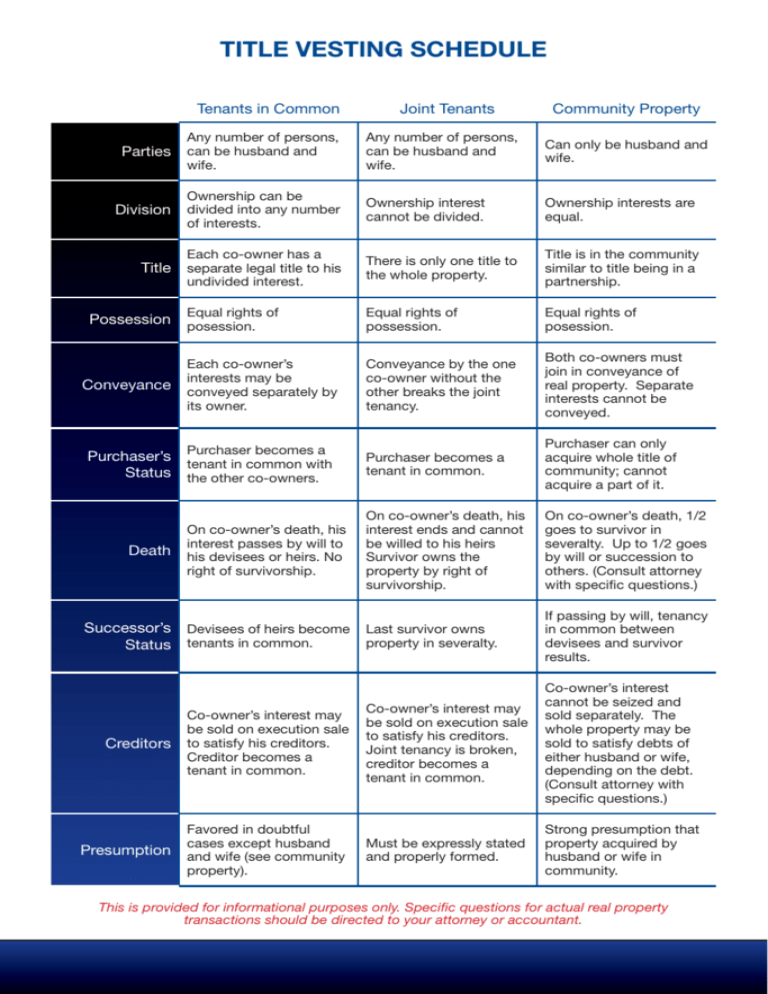
TITLE VESTING SCHEDULE Tenants in Common Any number of persons, Can only be husband and wife. Ownership interest cannot be divided. Ownership interests are equal. There is only one title to the whole property. Title is in the community similar to title being in a partnership. Equal rights of Equal rights of possession. Equal rights of posession. Each co-owner’s interests may be conveyed separately by its owner. Conveyance by the one co-owner without the other breaks the joint tenancy. Both co-owners must join in conveyance of real property. Separate interests cannot be conveyed. Purchaser becomes a tenant in common. Purchaser can only acquire whole title of community; cannot acquire a part of it. On co-owner’s death, his interest ends and cannot be willed to his heirs Survivor owns the property by right of survivorship. On co-owner’s death, 1/2 goes to survivor in severalty. Up to 1/2 goes by will or succession to others. (Consult attorney with specific questions.) wife. Ownership can be Division divided into any number of interests. Each co-owner has a Title separate legal title to his undivided interest. Possession posession. Purchaser’s Purchaser becomes a tenant in common with Status the other co-owners. Death Community Property Any number of persons, can be husband and wife. Parties can be husband and Conveyance Joint Tenants On co-owner’s death, his interest passes by will to his devisees or heirs. No right of survivorship. Successor’s Devisees of heirs become Last survivor owns property in severalty. Status tenants in common. If passing by will, tenancy in common between devisees and survivor results. Creditors Co-owner’s interest may be sold on execution sale to satisfy his creditors. Creditor becomes a tenant in common. Co-owner’s interest may be sold on execution sale to satisfy his creditors. Joint tenancy is broken, creditor becomes a tenant in common. Co-owner’s interest cannot be seized and sold separately. The whole property may be sold to satisfy debts of either husband or wife, depending on the debt. (Consult attorney with specific questions.) Presumption Favored in doubtful cases except husband and wife (see community property). Must be expressly stated and properly formed. Strong presumption that property acquired by husband or wife in community. This is provided for informational purposes only. Specific questions for actual real property transactions should be directed to your attorney or accountant. TAKING TITLE TO PROPERTY PURCHASED AT PUBLIC AUCTION The following samples are provided as a guide to assist you in determining how you want your property deeded. It is important to decide how you want the title to be recorded before you register for the public auction as records will not be changed once submitted. Husband and Wife as Joint Tenants John Doe and Jane Doe, as: Husband and Wife as Tenants in Common Husband and Wife as Community Property John Doe, as: a Married Man, as Sole and Separate Property a Single Man an Unmarried Man a Widower an Accommodator Jane Doe, as: a Married Woman, as Sole and Separate Property a Single Woman an Unmarried Woman a Widow an Accommodator John Doe and Jane Smith, a Single Man and a Single Woman as Joint Tenants as: a Single Man and a Single Woman as Tenants in Common John Doe and Tom Smith, a Single Man and a Single Man as Joint Tenants as: a Single Man and a Single Man as Tenants in Common John Doe, a Married Man, as to an Undivided 1/2 Interest and Jane Smith, a Single Tenants in Common Woman, as to an Undivided 1/2 Interest, as: John Doe, as Trustee of the: Doe and Doe, as: Jane Doe Living Trust Jane Doe 2005 Revocable Trust Jane Doe Irrevocable Trust Doe Family Trust dated 2005 John Doe and Jane Doe Trust Agreement dated 2005 a Partnership a Family Partnership a General Partnership a California Partnership a Corporation a California Corporation a California Non-Profit Corporation a California Closed Corporation The above information is provided as a general guide only. Specific and additional questions for actual real property transactions should be directed to your attorney or accountant.
